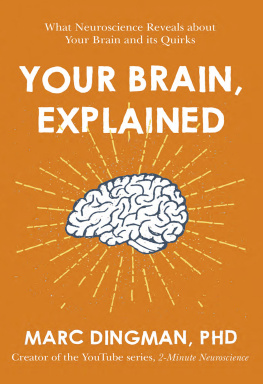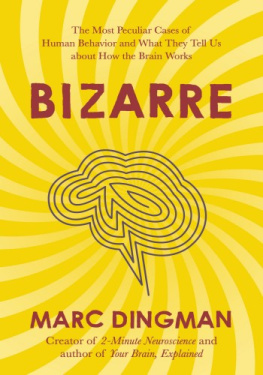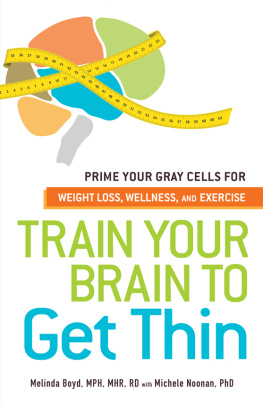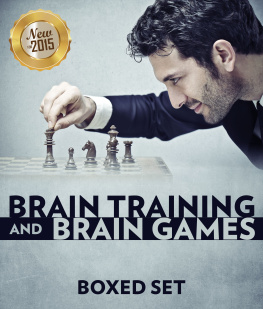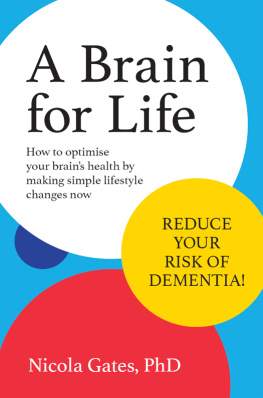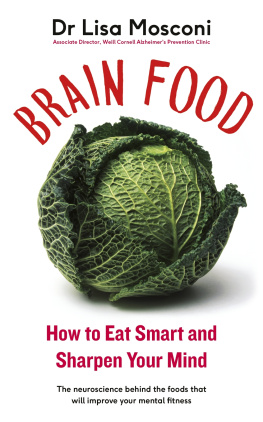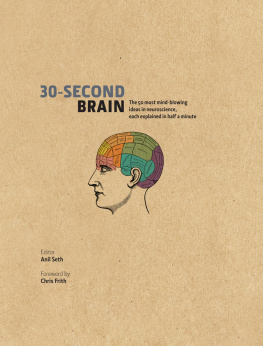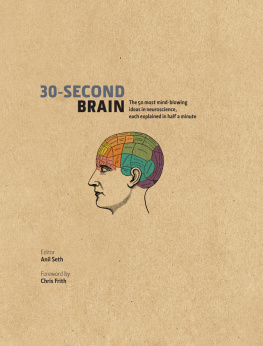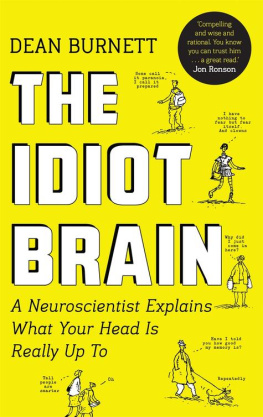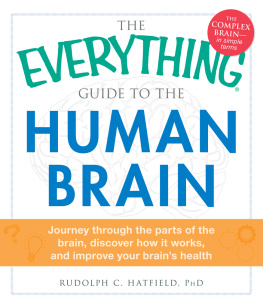
Contents
Page List
Praise for
YOUR BRAIN, EXPLAINED
An excellent, easy to read introduction to the complexities and wonders of the brain for anyone interested in science, medicine, and what makes us human. Reading like a collection of detective stories, Your Brain, Explained combines classic cases in the history of neurology with findings stemming from the latest techniques used to probe the brains secrets.
Stanley Finger, PhD, Professor Emeritus of Psychological
& Brain Sciences, Washington University (St. Louis),
author, Origins of Neuroscience; Minds behind the Brain;
and Franz Joseph Gall: Naturalist of the Mind,
Visionary of the Brain
An informative, accessible and engaging book for anyone who has even the slightest interest in how the brain works, but doesnt know where to begin.
Dean Burnett, PhD, author,
Happy Brain and Idiot Brain
This book lucidly explains what we think we know about this most mysterious of objects. Dingman weaves classic studies with modern research into easily digestible sections, to provide an excellent primer on the rapidly advancing field of neuroscience.
Moheb Costandi, author, Neuroplasticity and
50 Human Brain Ideas You Really Need to Know
... a highly readable and accessible introduction to the operation of the brain and current issues in neuroscience... a wonderful introduction to the field.
Frank Amthor, PhD, Professor of Psychology, The University of
Alabama at Birmingham, author of Neuroscience for Dummies
This book is a fun and informative read... I learned a lot and you will too!
John E. Dowling, PhD, Gordon and Llura Gund
Research Professor of Neurosciences, Harvard University, author,
Understanding the Brain: From Cells to Behavior to Cognition
First published in 2019 by Nicholas Brealey Publishing
An imprint of John Murray Press
An Hachette UK company
23 22 21 20 19 1 2 3 4 5 6 7 8 9 10
Copyright Marc Dingman 2019
The right of Marc Dingman to be identified as the Author of the Work has been asserted by him in accordance with the Copyright, Designs and Patents Act 1988.
All rights reserved. No part of this publication may be reproduced, stored in a retrieval system, or transmitted, in any form or by any means without the prior written permission of the publisher, nor be otherwise circulated in any form of binding or cover other than that in which it is published and without a similar condition being imposed on the subsequent purchaser.
A CIP catalogue record for this title is available from the British Library
Library of Congress Control Number: 2019934149
ISBN 978-1-47369-655-6
US eBook 978-1-47369-658-7
UK eBook 978-1-47369-659-4
John Murray Press Ltd
Carmelite House
50 Victoria Embankment
London EC4Y 0DZ
Tel: 020 3122 6000
Nicholas Brealey Publishing
Hachette Book Group
53 State Street
Boston, MA 02109, USA
Tel: (617) 263 1834
www.nbuspublishing.com
To Ky and Fia, my little scientists
ACKNOWLEDGMENTS
Any activity of a healthy brain, like me writing these words or you reading them, depends on the contributions of a long list of brain regions. If you take away just one of those regions, then things can go quite awry, and in some cases the whole machine can fail. In many ways, thats a great analogy for this book. Many others contributed to it, both directly and indirectly. Without any of them Your Brain, Explained might have never made it to publication. And even if it had, the quality of the final product would have been substantially diminished.
The team at Nicholas Brealey Publishing was obviously critical in moving this book from my head to the page. Thank you to: Alison Hankey, for seeing the potential in my manuscript even in its very early stages; Michelle Morgan, for her help navigating the publishing process from start to finish; Brett Halbleib, for his useful editorial suggestions; and everyone else on the team who I didnt get to know as well but whose work behind the scenes made this book possible.
I also want to thank my agent, Linda Konner, for being the first person to make me believe that someone might actually want to read something I wrote.
I owe a special thanks to Tom Gould for taking the time to read and fact-check my manuscript; his concise feedback led to substantial improvements to the book. Im also very grateful to others who read over sections of the book and offered critiques and compliments, especially Frank Amthor, Dean Burnett, Moheb Costandi, John Dowling, and Stanley Finger. Im still amazed at the generosity of those who were willing to take the time to read and comment on my workfor nothing more than lunch or a copy of the book in return.
Im extremely grateful to my parents for their unwavering support, patience, and unshakable belief in meeven at the times when it didnt seem warranted. Your trust eventually helped me to believe in myself, and that was necessary for me to have the confidence to embark on this project. Without you (literally and figuratively) this book would never have been possible.
I was incredibly fortunate to have my wife Michelle by my side throughout this venture. She was supportive from the very beginning, even when it wasnt clear if the ideas that I occasionally rambled about would ever amount to anything. Thank you for tolerating my early bedtimes so I could get up before dawn to write every day (along with all my other eccentricities), and for all the other things you do that are too numerous to list here. Knowing youre always in my corner makes everything I do a little bit easier.
To Ky and Fia, thank you for all the smiles and laughs, and for helping me realize whats truly important in my life. I strive every day to do things that will make you proud to call me Dad, and I hope this book is one of them.
Finally, I want to thank the 3,500-plus undergraduate students Ive had the honor of teaching since I became a faculty member at Penn State. I cant think of anything that has invigorated my desire to learn about neuroscience more than teaching you all about it, and being able to see the same curiosity in your eyes that I had when I began studying the brain.
INTRODUCTION
I n 1908, Kurt Goldstein was completing a residency at a psychiatric hospital in Germany when he encountered a highly unusual case. Goldstein was only five years out of medical school and just beginning what would end up being an extraordinarily successful career. Within the next few decades, he would become a highly respected neuropsychologist and an influential writer. He was one of the first to advocate for using a holistic approach to treat neurological patients, emphasizing the need to consider the patient as an individualas an organism, reallyrather than just a collection of symptoms. During World War I, he established a hospital that operated on this holistic philosophy to treat soldiers with brain injuries, and thousands of soldiers received treatment there before the Nazis chased Goldstein out of Germany because of his Jewish heritage. But early in his residency, Goldstein had already been confronted with what was likely the strangest case he would ever see.
The patient was a 57-year-old woman who had suffered a stroke two years earlier. Initially, the incident had paralyzed her left arm. Over time she regained movement in the arm, but with an odd complication: her left hand seemed to have a mind of its own. Sometimes it would move with unmistakable intentionagainst her willand other times it would obstinately interfere with movements she was making with her right hand. She described it as doing whatever it wanted to, by itself. When she went to take a drink with her right hand, the left hand would grab the cup and empty out the contents. When she laid down at night, it ripped the sheets off of her. Once, it even grabbed her by the neck and started choking her!
Next page
